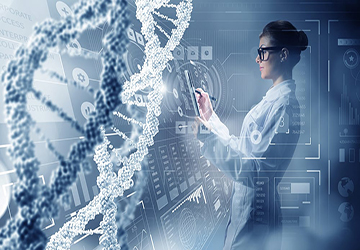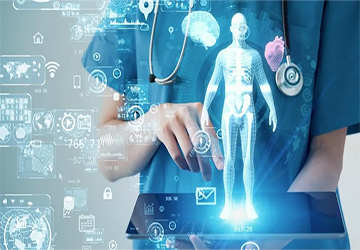AI is revolutionizing healthcare in several ways, including improving diagnostics, enabling personalized medicine, accelerating drug discovery, and automating administrative tasks. This article explores the transformative impact of artificial intelligence on the healthcare industry.
AI Improves Medical Diagnosis
Artificial intelligence has shown promise in improving the accuracy of medical diagnoses. Machine learning algorithms can be trained on large datasets of patient symptoms, medical histories, and test results to make a diagnosis. The benefits of AI diagnosis include:

● Consistent assessments, unaffected by human bias or fatigue
● Ability to recognize patterns in massive data sets beyond human ability
● Continuously learn and improve with new patient data
● Fast and efficient diagnosis and timely treatment
Studies have shown that AI can match or even outperform doctors in diagnosing certain conditions, including skin cancer, lung cancer, and neurological disorders. AI is not meant to replace doctors but as a tool to complement human expertise and avoid diagnostic errors.
AI enables personalized medicine
Artificial intelligence enables healthcare to be tailored to individuals like never before. Algorithms can analyze a patient's genetics, lifestyle, medical records, and more to determine their treatments. Personalized AI healthcare applications include:
● Screen patients for disease based on genetic predisposition
● Using biomarkers to predict patient response to drugs
● Adjust drug dosage based on ongoing patient monitoring
● Formulate customized treatment plans for chronic diseases
With artificial intelligence, the one-size-fits-all approach of the past can be abandoned in favor of healthcare that meets each patient's individual needs.
Artificial Intelligence Accelerates Drug Discovery
The traditional drug development process takes over a decade and costs billions. AI can potentially speed up this process and make it significantly cheaper. Some examples of how AI can aid in drug development include:
● Screen countless drug combinations using virtual high-throughput experiments
● Analyze large volumes of research data and literature that humans cannot process quickly
● Use generative artificial intelligence models to create novel molecular structures with desired properties
● Predict drug toxicity and potency without time-consuming physical testing
AI drug discovery is critical for pharmaceutical companies to remain innovative and competitive. This allows many more ideas to be tested in the search for potentially new life-saving drugs.

AI automates health management.
Healthcare systems generate vast amounts of data through patient records, insurance claims, surgical logs, etc. AI is used to simplify administrative processes and reduce costs. Applications include:
● Process paperwork such as claim forms and invoices using natural language processing
● Manage hospital supply chain logistics and inventory more efficiently
● Optimizing hospital operations with AI scheduling assistants
● Provide virtual customer service to patients through chatbots
By automating repetitive tasks, healthcare workers can focus their time on more meaningful tasks, such as patient care.
AI Improves Medical Imaging
Medical imaging such as X-rays, CT scans, and MRIs are the cornerstone of diagnosis. AI can improve the capture and analysis of images. Applications include:
● Adjust imaging equipment in real-time to improve image quality
● Using computer vision to detect anomalies and flag them for doctors
● More accurate segmentation of anatomical structures from images
● Generate 3D reconstructions from 2D image slices
By improving imaging, AI enables doctors to gather more accurate visual information about a patient's health and speed up diagnosis.
Diploma
Artificial intelligence is revolutionizing healthcare, from diagnosis to drug development to delivery. Machine learning has enormous potential to improve patient outcomes through personalized treatment plans, increase access to healthcare, improve and reduce costs, and make medicines more effective overall. Although AI is still in its infancy, it could transform healthcare for decades.